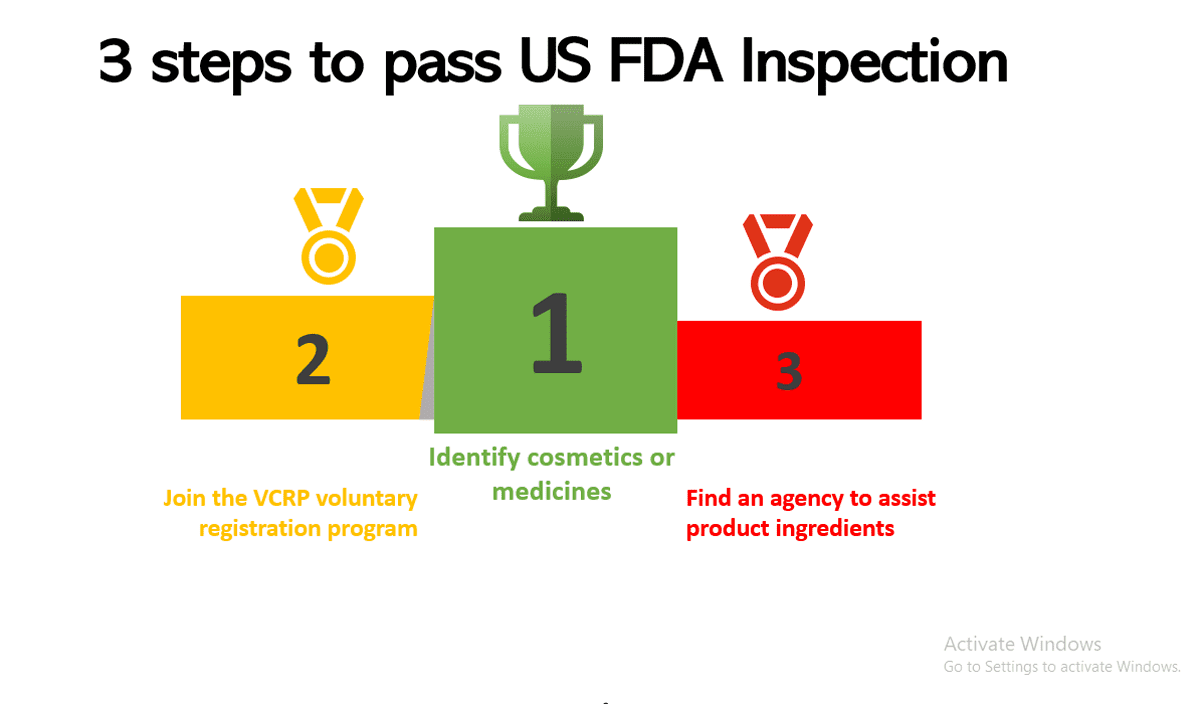Since if cosmetics are to be sold in the United States, they must pass the US Food and Drug Administration FDA level. However, because the United States defines cosmetics differently from other countries, it is necessary to pay attention to whether the product uses, and specifications cover drugs.
For example, some countries regard sunscreen products as cosmetics, but in the United States they are regulated as drugs. In the United States, products with effects related to skin structure or function, such as hair growth, skin protection, pain relief, and anti-aging, as well as products for the treatment of pimples, dandruff, eczema or dermatitis, are all considered medicines. If the products are regarded as medicines or have the properties of cosmetics and medicines, they must be registered.
Step 1: Identify cosmetics or medicines
Step 2: Join the VCRP voluntary registration program
Step 3: Find an agency to assist product ingredients and labeling in compliance with FDA regulations
Step 1: Identify cosmetics or medicines
U.S. statutes treat certain “personal care products” as drugs or have the properties of both cosmetics and drugs. If the U.S. statute treats your product as a drug, it must be governed by drug-related statutes, such as obtaining a license before marketing. Of course, if you find this part to be troublesome, you can also help through an agency.
Step 2: Join the VCRP voluntary registration program
Although the FDA does not require the registration of trademarks for cosmetics, the VCRP voluntary registration program can reduce the possibility of “violating customs clearance”. The FDA encourages domestic and foreign cosmetics companies to register their companies and submit Cosmetic Product Ingredient Statements (Cosmetic Product Ingredient Statements) through our Voluntary Cosmetic Registration Program (VCRP) (Voluntary Cosmetic Registration Program). The companies are free to participate, not mandatory.
Benefits of joining VCRP:
FDA will notify registered merchants whether cosmetic ingredients comply with FDA’s existing specifications.
As long as the FDA finds that the merchant uses unapproved or other prohibited ingredients in the formula, it will remind the merchant that the seller can modify the product formula before import or sale to avoid being detained by the customs when the product is imported for sampling due to ingredient problems.
Note: If the ingredients used are relatively new, it is recommended to apply for ingredient registration on a voluntary basis or start with CAS (Chemical Substance Access Number) to increase the convenience of future customs clearance.
Help retailers identify safety-conscious manufacturers
FDA is a law enforcement agency. It does not provide any product certification. Therefore, merchants registered with VCRP do not mean that they meet FDA approval. However, merchants who join the voluntary registration program will enter the government’s data database, so sometimes such as department stores The company’s retailers sometimes consult the FDA for information to confirm whether a cosmetics company has been registered with the FDA and become the preferred merchant.
Step 3: Find an agency to assist product ingredients and labeling in compliance with FDA regulations
How does FDA monitor imported cosmetics?
Imported cosmetics must be inspected by CBP (US Customs and Border Protection) when they enter the United States. Although all imported products will not be randomly inspected, for foreign-produced cosmetics, if adulteration or false labeling is found, then Will be refused entry, the goods must be destroyed or re-exported in accordance with regulations. The FDA website will list the cosmetics that are refused to be imported and update it monthly.
Do “natural” or “organic” cosmetics need to be certified?
The FDA has not defined or regulated the meaning of terms such as “organic” and “natural”. However, the United States Department of Agriculture (USDA) has regulations governing the use of the term “organic” in the marketing of agricultural products. For questions about the use of organic agricultural products, please contact USDA. Private organizations also define “natural” and other claims, but these organizations have nothing to do with the FDA. At the same time, please remember that all cosmetics must be safe regardless of the source of the ingredients. The source of ingredients does not determine its safety. For more information, see “Organic’ Cosmetics”.
What are the requirements for cosmetics labeling?
For more information about cosmetic labeling, please see “Labeling” and other resources listed on this page, such as “Cosmetic Labeling Guide”.
To read more about FDA Inspection visit ‘How to pass FDA inspection to sell cosmetics in USA?‘

